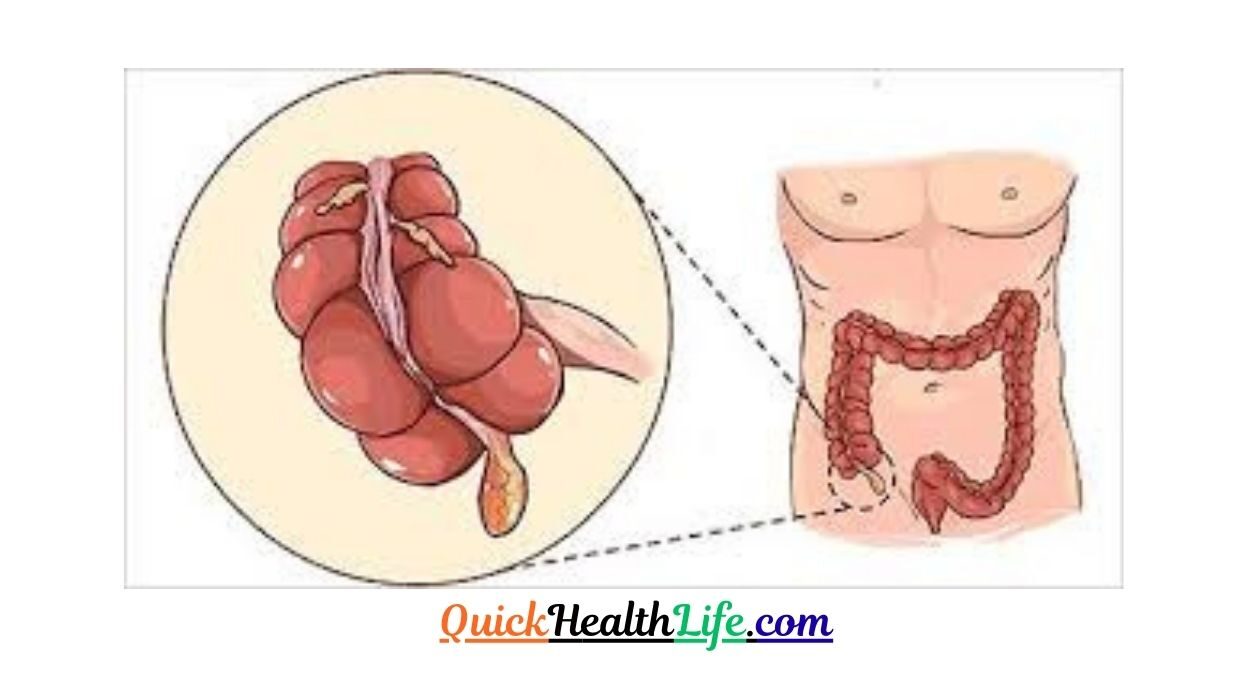What is Appendicitis?
Appendicitis is a sudden inflammation of the appendix, a small finger-like pouch attached to the large intestine. It is one of the most common causes of emergency abdominal surgery worldwide.
If left untreated, the appendix may burst (rupture), causing life-threatening infection. That’s why quick recognition and treatment are very important.
Table of Contents
Symptoms of Appendicitis
Appendicitis symptoms vary but usually develop within 12–24 hours.
Common Symptoms
- Sudden pain starting near the belly button and moving to the lower right abdomen
- Loss of appetite
- Nausea or vomiting
- Fever (low-grade)
- Constipation or diarrhea
- Swollen abdomen
Appendix Symptoms in Females
In women, symptoms can sometimes be confused with:
- Ovarian cysts
- Menstrual pain
- Pelvic infections
👉 If pain is severe and localized in the right lower abdomen, always consider appendicitis.
4 Stages of Appendicitis
Doctors often classify appendicitis into stages:
- Early Stage (Simple Appendicitis): Mild abdominal pain, nausea.
- Suppurative Stage: Pus starts forming inside the appendix.
- Gangrenous Stage: Appendix tissue begins to die due to lack of blood supply.
- Perforated Stage (Rupture): Appendix bursts, spreading infection in the abdomen.
Causes of Appendicitis
The exact cause is not always clear, but common reasons include:
- Blockage of Appendix Opening: Due to stool (fecalith), parasites, or growths.
- Infection: Bacterial or viral infections in the digestive tract.
- Inflammation of Lymph Nodes: Can block the appendix in children.
- Family History: Genetics may play a role.
What Does Appendicitis Pain Feel Like?
- Starts as a dull ache near the belly button.
- Moves to the lower right side of the abdomen.
- Becomes sharp, constant, and severe with time.
- Pain worsens with coughing, sneezing, or sudden movements.
How to Check for Appendicitis at Home
While only a doctor can confirm, you can notice signs:
- Press gently on the lower right abdomen. If pain increases when you release pressure, it may suggest appendicitis.
- Walking or coughing worsens the pain.
- Persistent pain for more than 6–12 hours needs urgent medical attention.
Appendicitis Diagnosis
Doctors use a mix of physical exam, lab tests, and imaging.
- Physical Exam: Checking for tenderness in the right lower abdomen.
- Blood Test: Detects infection (high white blood cells).
- Urine Test: Rules out urinary tract infections or kidney stones.
- Ultrasound/CT Scan: Best imaging tests to confirm appendicitis.
Appendicitis Treatment
Surgery (Appendectomy)
- Most common treatment – removes the appendix.
- Can be done as open surgery or laparoscopic (keyhole) surgery.
- Quick recovery in laparoscopic cases.
Non-Surgical Treatment
- In selected patients, antibiotics may treat appendicitis.
- However, there is a chance of recurrence.
Can You Cure Appendicitis Without Surgery?
- Mild cases may respond to antibiotics.
- But in most patients, surgery is the safest and permanent treatment.
- Without surgery, risk of rupture increases.
👉 Doctors usually recommend surgery for long-term safety.
Complications of Appendicitis
If not treated quickly, appendicitis can cause:
- Appendix Rupture → severe infection
- Abscess Formation → pus collection in the abdomen
- Sepsis → life-threatening body infection
- Fertility Issues in Women → if infection spreads to pelvic organs
Recovery After Appendicitis Surgery
- Hospital stay: 1–2 days (laparoscopic), 3–5 days (open surgery)
- Full recovery: 2–4 weeks
- Avoid heavy exercise for 4–6 weeks
- Healthy diet and hydration speed up healing
Appendicitis Surgery Cost
| Country | Average Cost (Laparoscopic) | Average Cost (Open Surgery) |
|---|---|---|
| India | ₹40,000 – ₹1,20,000 | ₹30,000 – ₹90,000 |
| USA | $8,000 – $30,000 | $6,000 – $20,000 |
| UK | £5,000 – £12,000 | £4,000 – £9,000 |
👉 Cost depends on hospital, city, and whether insurance is available.
Pros and Cons of Appendectomy
✅ Pros
- Permanent solution
- Prevents life-threatening rupture
- Quick recovery with laparoscopy
❌ Cons
- Surgical risks (bleeding, infection)
- Small scars
- Rare chance of bowel obstruction later
FAQs About on appendicitis
1. What causes appendicitis?
Appendicitis is mainly caused by a blockage of the appendix, infections, or inflammation.
2. What is appendicitis pain like?
It starts near the belly button, shifts to the lower right abdomen, and becomes sharp and severe.
3. How do you treat appendicitis?
The most effective treatment is surgery (appendectomy). Antibiotics are sometimes used in mild cases.
4. Can you cure appendicitis without surgery?
Sometimes antibiotics help, but surgery is the safest and permanent treatment.
5. What are the 4 stages of appendicitis?
Early stage, suppurative, gangrenous, and perforated (rupture).
6. What test confirms appendicitis?
Doctors use physical exam, blood test, urine test, and imaging (ultrasound/CT scan).
Conclusion
Appendicitis is a serious but treatable condition. Knowing the symptoms, causes, and stages can save lives. Quick diagnosis and treatment are very important because delay can lead to complications.



